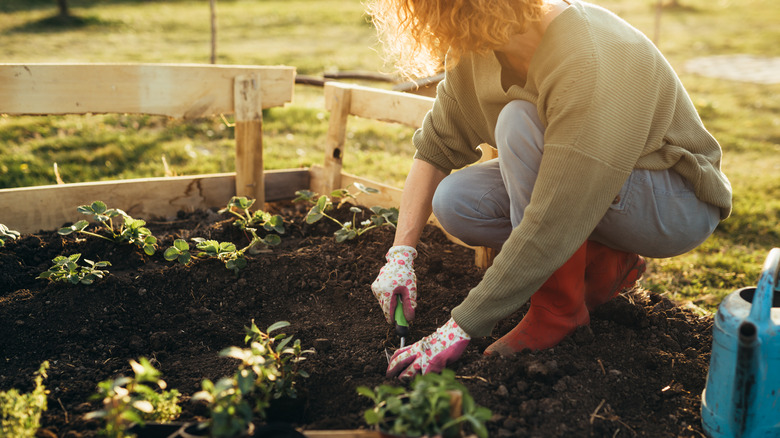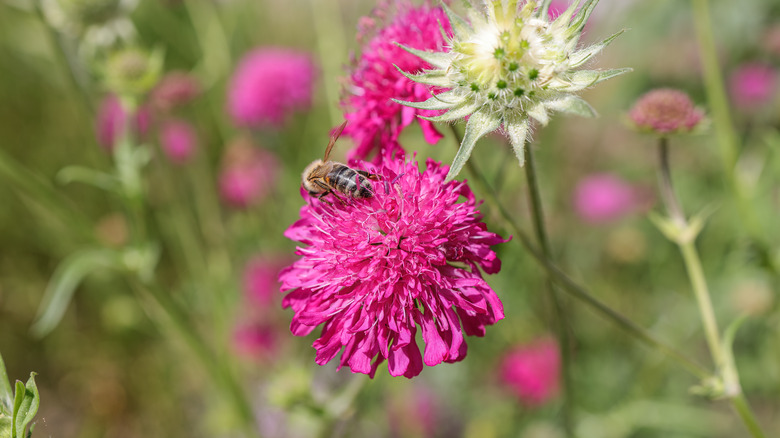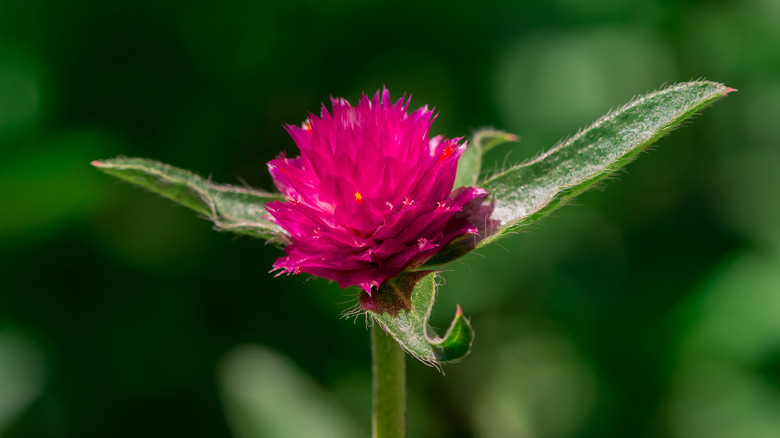This Non-Native Maroon Perennial Is Great For Beginner Gardeners
If you're a gardening newbie, one of your biggest fears is likely to be investing time, effort, and money into creating a garden only to have your plants fail to thrive or even die. This is precisely why you need to do your research and choose the right plants to cultivate. Knautia macedonica, also known as Macedonian scabious, crimson scabious, or simply "Knautia," is among the delightful perennial plants recommended for beginner gardeners. With its charming and long-lasting soft pink to deep crimson or maroon flowers and minimal maintenance requirements, Knautia is a fantastic plant choice to easily add beauty and diversity to your landscape.
This plant, native to Romania and the Balkan Peninsula, forms clumps of upright stems bearing clusters of pincushion-like flowers atop slender, wiry stems. The blooms are rich in nectar, attracting pollinators like bees, hummingbirds, and butterflies to the garden, as well as beneficial insects. Birds also enjoy snacking on Knautia seeds. As a perennial, this plant returns year after year, producing abundant blooms from early summer to fall and providing long-lasting beauty and interest throughout the growing season. This resilient and adaptable plant is deer- and drought-resistant and tolerates a wide range of growing conditions, making it suitable for gardeners with varying levels of experience.
Plant your Knautia in a sunny, sandy patch for best results
Planting Knautia is a straightforward process that requires attention to a few key factors, such as its lighting, watering, soil and fertilizer requirements, plus some knowledge of basic garden pest management. Choose a location that receives full sun (for about six hours a day). This plant thrives in sunny conditions but can tolerate some shade, especially in hot climates.
It prefers normal or sandy soil that's evenly moist but not waterlogged. This is especially important during the plant's establishment period. Once it takes root, Knautia is relatively drought-tolerant and only requires occasional watering during dry spells. It prefers well-drained soil. In general, Knautia won't need fertilizing if it's planted in good-quality soil. If the soil seems to lack nutrients, amend it with organic matter like compost. This plant is generally resistant to pests and diseases, but it may occasionally encounter issues like powdery mildew or aphids. Monitor your plant regularly for signs of pests or disease and address any problems promptly with appropriate treatments, such as neem oil or insecticidal soap.
Knautia care requires simple spring maintenance
Once your Knautia is established, it requires minimal care and attention. Just remember to remove spent flowers regularly to encourage continuous blooming and prevent self-seeding. This also helps maintain the plant's neat appearance throughout the growing season. Every three to four years, divide mature Knautia macedonica plants in the spring to rejuvenate them and prevent overcrowding. Divide the clumps in early spring or fall, and replant the divisions in well-prepared soil. In colder climates, consider providing winter protection by applying a layer of organic mulch around the base of the plant to insulate the roots from freezing temperatures.
Besides Knautia macedonica, other highly recommended easy planting options for beginner gardeners include sedum, echinacea (coneflower), peonies, hostas, and coreopsis. By incorporating beginner-friendly plants into your garden landscape, you can enjoy the beauty and rewards of gardening while gaining confidence and experience in caring for your outdoor space.


